Results
-
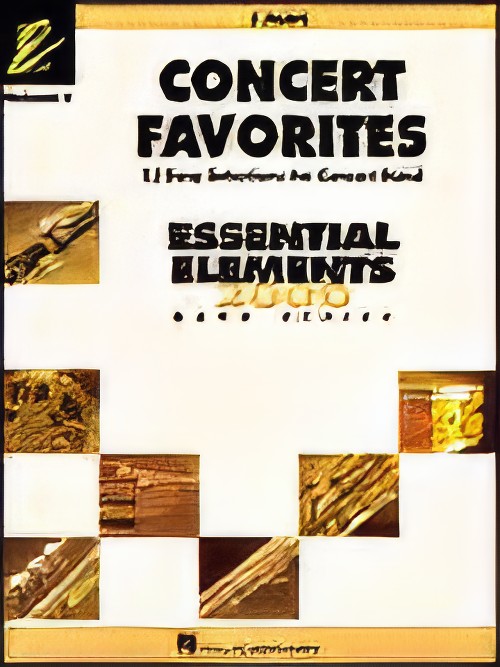 £8.50
£8.50Concert Favorites Vol.1 F Horn
For beginning concert band, but playable with just: Flute or Oboe; Clarinet; Alto Sax; Tenor Sax; Trumpet; F Horn; Bass line (Bassoon/Alto Clarinet/Bass Clarinet/Baritone Sax/Trombone/Baritone BC/Baritone TC or Tuba); Percussion & Keyboard Percussion. Includes: When the Saints Go Marching In; Let's Rock; Majestic March; Power Rock, Farandole; Jus' Plain Blues; My Heart Will Go On; Rainbow Connection; Supercalifragilisticexpialidocious; Do-Re-Mi; Drums of Corona; Laredo (Concert March); Pomp and Circumstance; Stratford March.
Estimated dispatch 7-14 working days
-
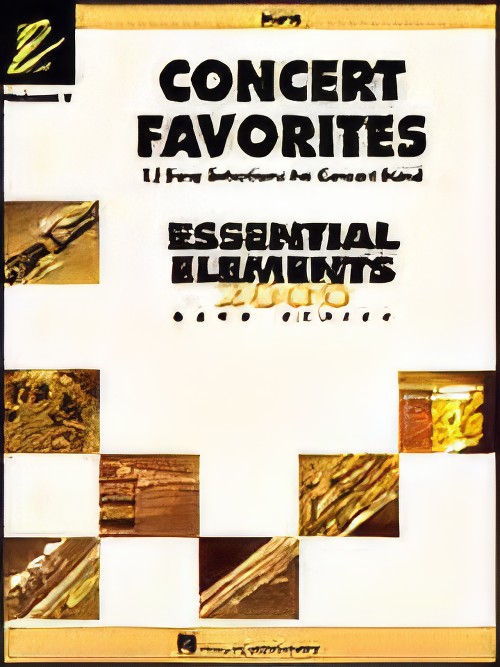 £8.50
£8.50Concert Favorites Vol.1 Flute
For beginning concert band, but playable with just: Flute or Oboe; Clarinet; Alto Sax; Tenor Sax; Trumpet; F Horn; Bass line (Bassoon/Alto Clarinet/Bass Clarinet/Baritone Sax/Trombone/Baritone BC/Baritone TC or Tuba); Percussion & Keyboard Percussion. Includes: When the Saints Go Marching In; Let's Rock; Majestic March; Power Rock, Farandole; Jus' Plain Blues; My Heart Will Go On; Rainbow Connection; Supercalifragilisticexpialidocious; Do-Re-Mi; Drums of Corona; Laredo (Concert March); Pomp and Circumstance; Stratford March.
Estimated dispatch 7-14 working days
-
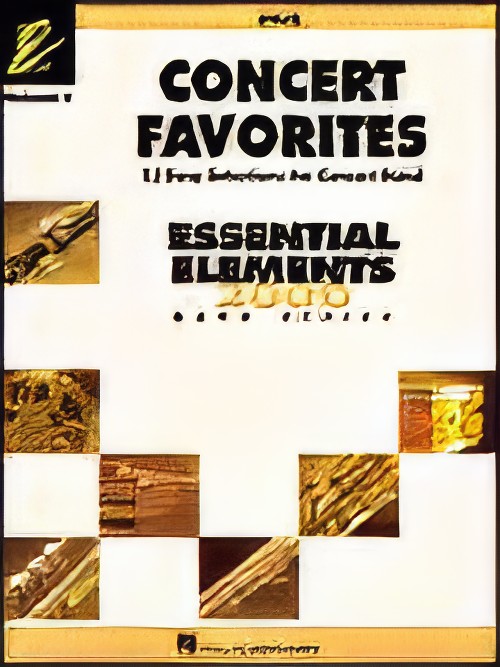 £8.50
£8.50Concert Favorites Vol.1 Oboe
For beginning concert band, but playable with just: Flute or Oboe; Clarinet; Alto Sax; Tenor Sax; Trumpet; F Horn; Bass line (Bassoon/Alto Clarinet/Bass Clarinet/Baritone Sax/Trombone/Baritone BC/Baritone TC or Tuba); Percussion & Keyboard Percussion. Includes: When the Saints Go Marching In; Let's Rock; Majestic March; Power Rock, Farandole; Jus' Plain Blues; My Heart Will Go On; Rainbow Connection; Supercalifragilisticexpialidocious; Do-Re-Mi; Drums of Corona; Laredo (Concert March); Pomp and Circumstance; Stratford March.
Estimated dispatch 7-14 working days
-
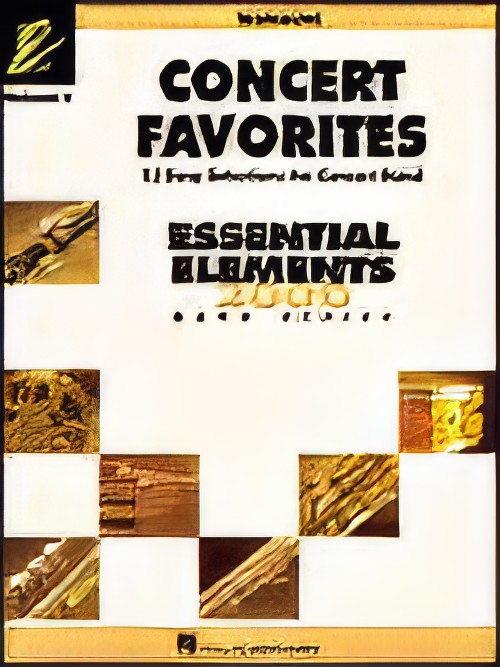 £8.50
£8.50Concert Favorites Vol.1 Trombone BC
For beginning concert band, but playable with just: Flute or Oboe; Clarinet; Alto Sax; Tenor Sax; Trumpet; F Horn; Bass line (Bassoon/Alto Clarinet/Bass Clarinet/Baritone Sax/Trombone/Baritone BC/Baritone TC or Tuba); Percussion & Keyboard Percussion. Includes: When the Saints Go Marching In; Let's Rock; Majestic March; Power Rock, Farandole; Jus' Plain Blues; My Heart Will Go On; Rainbow Connection; Supercalifragilisticexpialidocious; Do-Re-Mi; Drums of Corona; Laredo (Concert March); Pomp and Circumstance; Stratford March.
Estimated dispatch 7-14 working days
-
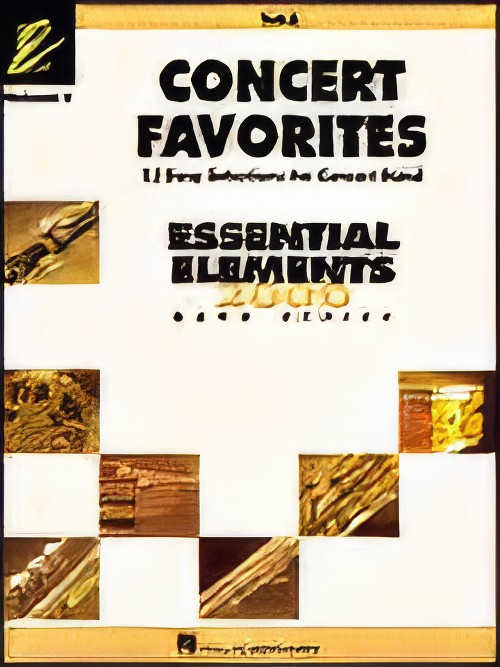 £8.50
£8.50Concert Favorites Vol.1 Tuba
For beginning concert band, but playable with just: Flute or Oboe; Clarinet; Alto Sax; Tenor Sax; Trumpet; F Horn; Bass line (Bassoon/Alto Clarinet/Bass Clarinet/Baritone Sax/Trombone/Baritone BC/Baritone TC or Tuba); Percussion & Keyboard Percussion. Includes: When the Saints Go Marching In; Let's Rock; Majestic March; Power Rock, Farandole; Jus' Plain Blues; My Heart Will Go On; Rainbow Connection; Supercalifragilisticexpialidocious; Do-Re-Mi; Drums of Corona; Laredo (Concert March); Pomp and Circumstance; Stratford March.
Estimated dispatch 7-14 working days
-
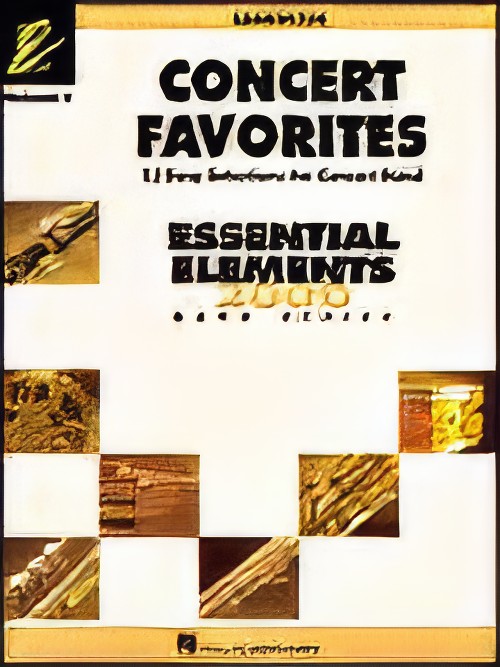 £149.99
£149.99Concert Favorites Vol.1 Value Set - Sweeney, Michael
Score & 17 parts) For beginning concert band, but playable with just: Flute or Oboe; Clarinet; Alto Sax; Tenor Sax; Trumpet; F Horn; Bass line (Bassoon/Alto Clarinet/Bass Clarinet/Baritone Sax/Trombone/Baritone BC/Baritone TC or Tuba); Percussion & Keyboard Percussion. Includes: When the Saints Go Marching In; Let's Rock; Majestic March; Power Rock, Farandole; Jus' Plain Blues; My Heart Will Go On; Rainbow Connection; Supercalifragilisticexpialidocious; Do-Re-Mi; Drums of Corona; Laredo (Concert March); Pomp and Circumstance; Stratford March.
Estimated dispatch 7-14 working days
-
£72.95
Three Christmas Spirituals
Based on three famous African-American spirituals'Children Go Where I Send Thee, Rise Up Shepherd and Follow, and Go Tell It on the Mountain, arranger Andrew Balent weaves these beloved tunes into a concert rhapsody for the holiday season.
Estimated dispatch 7-14 working days
-
£29.95
Share My Yoke - Score and Parts - Joy Webb
Program NotesMajor Joy Webb has a unique and special gift for writing songs that achieve massive popularity, both for the purity of their musical integrity and for the depth of their poetic and literal strength. One of the members of The Salvation Army's 1960s phenomenon "The Joystrings," Joy Webb has a string of popular songs to her name, several of which contributed to the charts successes of enjoyed by the group. In more recent years, many of her tunes have found their why into instrumental repertoire.A prime example of Joy's remarkable gifting is her beautiful Share My Yoke. Although the deeply spiritual words of Share My Yoke may be unfamiliar to some, the sheer beauty of the melody is without doubt. The chorus is reproduced here to offer an insight into the song's meaning:Your slightest movement I will feel and understand.Share my yoke, and come the way that I must go,In our togetherness my peace you'll know.The world beholding us will see it's so.Calling for real sensitivity both from soloist and accompanying group, this is an extremely rewarding piece to play - and a moving listening experience for the audience.The arranger, Ivor Bosanko, who lives in California following retirement from the post of Territorial Music Director in The Salvation Army's USA Western Territory, is himself a respected songwriter, composer and arranger. He has produced this wonderfully sensitive and evocative arrangement of the song for cornet soloist and band. Already widely used and recorded in its original brass band form, this arrangement for concert band will undoubtedly be a useful and valuable addition to repertoire.
Estimated dispatch 7-14 working days
-
£5.95
Share My Yoke - Score only - Joy Webb
Program NotesMajor Joy Webb has a unique and special gift for writing songs that achieve massive popularity, both for the purity of their musical integrity and for the depth of their poetic and literal strength. One of the members of The Salvation Army's 1960s phenomenon "The Joystrings," Joy Webb has a string of popular songs to her name, several of which contributed to the charts successes of enjoyed by the group. In more recent years, many of her tunes have found their why into instrumental repertoire.A prime example of Joy's remarkable gifting is her beautiful Share My Yoke. Although the deeply spiritual words of Share My Yoke may be unfamiliar to some, the sheer beauty of the melody is without doubt. The chorus is reproduced here to offer an insight into the song's meaning:Your slightest movement I will feel and understand.Share my yoke, and come the way that I must go,In our togetherness my peace you'll know.The world beholding us will see it's so.Calling for real sensitivity both from soloist and accompanying group, this is an extremely rewarding piece to play - and a moving listening experience for the audience.The arranger, Ivor Bosanko, who lives in California following retirement from the post of Territorial Music Director in The Salvation Army's USA Western Territory, is himself a respected songwriter, composer and arranger. He has produced this wonderfully sensitive and evocative arrangement of the song for cornet soloist and band. Already widely used and recorded in its original brass band form, this arrangement for concert band will undoubtedly be a useful and valuable addition to repertoire.
Estimated dispatch 7-14 working days
-
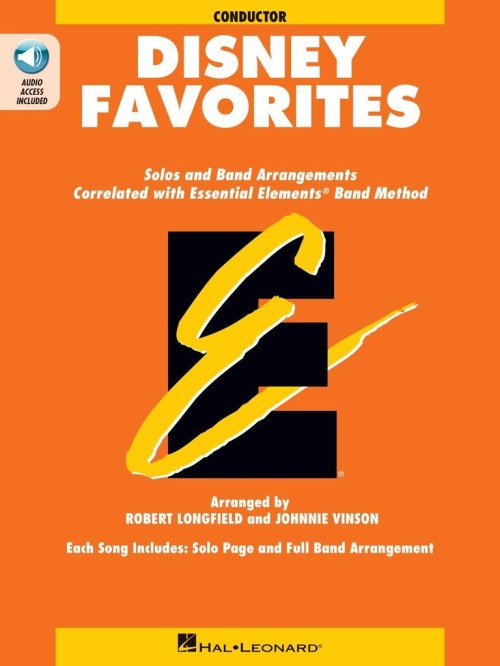 £8.99
£8.99Disney Favorites (Concert Band Instrumental Folio Books) - Longfield & Vinson
There's no better way to motivate your band than with some popular Disney music! This collection from Essential Elements works with all ensembles, regardless of what method you're using, and features great songs your band members are sure to know. The arrangements work for the whole ensemble to play together, but also as solo works for each instrumentalist! The songs are carefully correlated to correspond with instruction in the Essential Elements method books 1 and 2 so you'll know exactly when your group is ready to take on another song. A handy chart is provided in the table of contents so you can see the progress requirements.Songs include:Beauty and the Beast (from Beauty and the Beast)Can You Feel the Love Tonight (from The Lion King)Colors of the Wind (from Pocahontas)He's a Pirate (from Pirates of the Caribbean: The Curse of the Black Pearl)Let It Go (from Frozen)Remember Me (Ernesto de la Cruz) (from Coco)Try Everything (from Zootopia)Under the Sea (from The Little Mermaid)We Don't Talk About Bruno (from Encanto)We're All in This Together (from High School Musical)Each student book includes parts for the full band arrangement as well as separate pages for solo use. The conductor's edition includes full scores of all the band arrangements and a sample solo page of each song as well as access to online full-band recordings of each song.The Value Pack includes:1 x Conductor Book with Online Audio6 x Flute1 x Oboe1 x Bassoon6 x Clarinet1 x Bass Clarinet4 x Alto Saxophone1 x Tenor Saxophone1 x Bari Saxophone6 x Trumpet2 x F Horn2 x Trombone1 x Baritone BC1 x Baritone TC1 x Tuba2 x Percussion1 x Keyboard Percussion
Estimated dispatch 7-14 working days
